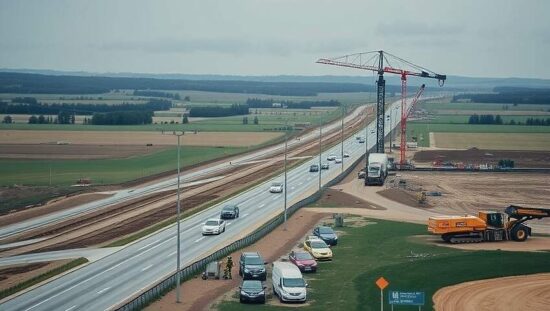The German Chamber of Industry and Commerce (DIHK) has called on the current governing coalition to prioritize the completion of remaining gaps in the nation’s Autobahn (highway) network and to adjust planning regulations to facilitate this.
DIHK President Peter Adrian highlighted the persistent issue of disconnected regions and missing links within the Autobahn system, noting instances where stretches of 20 to 25 kilometers are absent. He expressed concern that the construction of these often short segments has been stalled for years, frequently due to protracted assessments and bureaucratic hurdles.
“We still have regions that are left behind and gaps in the network” Adrian stated. He advocated for treating the closure of these Autobahn gaps with the same level of urgency previously applied to the expansion of renewable energy sources. Successfully addressing these long-standing deficiencies would send a powerful signal to both residents and businesses in affected regions, he argued, demonstrating a commitment to their needs.
Beyond infrastructure, Adrian also emphasized the often-overlooked importance of rural areas and their contribution to the German economy. He challenged the perception of rural landscapes as solely providers of nature and recreation, underscoring their significant economic role that extends far beyond agriculture.
According to Adrian, approximately half of Germany’s total gross value added is generated in rural areas, rising to nearly two-thirds in the case of industrial output. A significant majority – 70 percent – of Germany’s “Hidden Champions” companies that are global market leaders in their respective niches, are based in rural settings. Adrian noted that economic leadership isn’s solely dictated by urban hubs like Berlin and Hamburg, but by regions such as the Swabian Alb, Allgäu and Ostwestfalen-Lippe.
However, businesses in rural locations are disproportionately affected by the ongoing skills shortage, a challenge that needs specific political attention. Adrian stressed the need to ensure adequate public services across the country, including reliable mobile networks, fiber optic connections, medical care and reasonable public transportation services.
He pointed out the stark disparity in internet accessibility: 86 percent of households in urban areas have access to bandwidth exceeding 1,000 megabits per second, compared to just 36 percent in rural areas. Emphasizing the need for both 5G connectivity and expansion of fiber optic infrastructure, Adrian concluded that equal living conditions across the nation are unattainable without addressing this digital divide.





